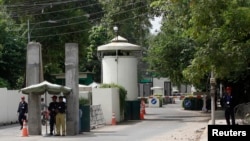In an apparent tit-for-tat, Pakistan announced unspecified travel restrictions on American diplomats Friday and withdrew concessions it had granted to U.S. missions as part of the "war on terror," dealing a major blow to what one ex-Pakistani diplomat described as "strayed" bilateral relations.
The decision comes after Washington said Pakistani diplomats would be required to seek permission five days in advance before traveling more than 40 kilometers from their posts in the United States.
A Foreign Ministry letter sent to the U.S. Embassy in Islamabad said without elaborating that "reciprocal travel permission" was being put into place in Pakistan. U.S. diplomats and embassy staff have recently complained of being subjected to searches and questioning by intelligence officials when leaving the embassy compound.
The letter also confirmed that Pakistan “has been informed that the new travel permission regime for Pakistani diplomats and officials in the U.S. would be implemented from 11 May 2018.”
The letter noted that diplomats posted to missions in Pakistan do not require prior permission for traveling inside the country, with one exception. It said permission is required if a visit is planned to “designated prohibited/restricted areas … in view of the security imperatives.”
Under the new restrictions, special treatment for U.S. Embassy and consulate staff at the airports ends. Their cargo will have to be scanned like that of other passengers at airports to prevent them from traveling with security- or intelligence-related gadgets and other prohibited items.
A former Pakistani ambassador to Washington, Jalil Abbas Jilani, said in a tweet the restrictions are “a sign of strayed” relations and called on both countries to repair them.
“Restricting movements of Diplomats was a norm in Moscow and Islamabad during cold war and a regular practice between Pakistan and India even today but unheard of in the context of Pakistan and the US,” tweeted Jilani.
He was referring to a time when Pakistan sided with the U.S. to arm and train Afghan mujahideen or freedom fighters to battle the Soviet occupation of Afghanistan.
Pakistan's letter outlined a list of concessions it has withdrawn from the U.S. diplomatic mission. American diplomats, according to the list, will now require permission before “installing radio communication at residences and safe houses.”
The U.S. mission also has been instructed not to use “tinted glass” on vehicles and rented transportation and to stop installing non-diplomatic license plates on official vehicles. Diplomatic staff will no longer be allowed to use “biometrically unverified/cell phone SIMs.”
It was the first disclosure of the concessions, which were granted the U.S. after Pakistan joined the "war on terrorism" 17 years ago. Pakistani analysts described them as “shocking and scandalous.”
“As Islamabad imposes tit-for-tat limits on U.S. embassy staff, the nation gets to know only some of the exemptions Americans were enjoying here,” noted TV talk show host and columnist Talat Hussain.
The reciprocal restrictions on diplomats has become an “accidental nationalistic rallying point against perceived U.S. manipulation of Pakistan,” Hussain added.
Pakistan’s relations with the U.S. have steadily deteriorated since President Donald Trump announced a new South Asia strategy that blamed Islamabad for covertly supporting terrorist groups and the Taliban in neighboring Afghanistan.
Pakistani officials have rejected the charges and maintain that their country is being scapegoated for Washington’s security failures in Afghanistan.
Relations are also strained by a court order barring an American diplomat from leaving the country. Pakistan is seeking to hold the diplomat accountable for a fatal road accident despite the immunity he enjoys under international diplomatic conventions.




